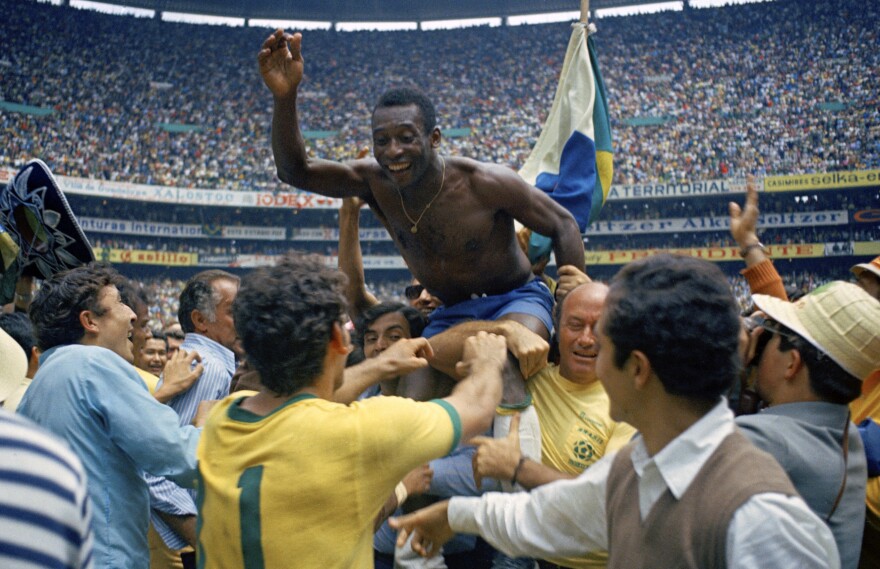COMMENTARY Having Pelé's dignified memory hanging in the air helps us understand what's at stake after the degrading attack in Brasília by Jair Bolsonaro's followers.
The only good thing about the dark, destructive attack on democracy in Brazil on Sunday — the MAGA-style ransacking of the Congress, Supreme Court and Planalto presidential palace — is that it happened shortly after 82-year-old Pelé passed away on Dec. 29.
For anyone trying to make sense of, to find meaning in, Sunday’s mayhem — in the degrading assault on Brazil’s most important republican institutions — it helps to have the dignified glow of the Brazilian soccer legend’s memory still hanging in the air.
It helps, like one of his elegant assists, to have the footage of Pelé’s sublime goals and goodwill smiles playing in our heads as we try to process the video of shattered glass and sneering fascists terrorizing Brasília last weekend. It puts in bolder relief, actually, what’s at stake in Brazil right now.
That’s because Pelé performed so many of his marvels — and projected so much of his charme brasileiro — during the brutal, right-wing military dictatorship that gripped Brazil from 1964 to 1985. That is, the same regime that the thousands of Brasília rioters, all supporters of former far-right-wing President Jair Bolsonaro, consider the country’s época dourada, or golden age.
Pelé may not have been outspoken in his opposition to that jackbooted rule, and he was criticized for it. Then again, historical evidence indicates he knew that if he had been more vocal, the dictatorship would have crushed him, and hard.
But either way, Pelé in the end really didn’t have to be a political activist. Everything he stood for — from the freedom of expression his “beautiful game” exuded, to the racial inclusion he championed — was antithetical to the dictatorship in ways that I think eventually helped undermine its psychological hold on Brazil.
READ MORE: In 2022, the Americas said no to crazy — and louco. But it won't echo at Mar-a-Lago
Which is why it’s so wrong to see Bolsonaro supporters, especially Sunday’s barbarians, wearing the yellow-and-green Brazilian soccer jersey, which Pelé made famous, as their uniform.
That shirt — like Brazil’s yellow-and-green flag, emblazoned with the motto “Order and Progress” — should be a symbol of the nation’s futurist potential and multicultural joy. It’s not meant to be the banner of a retro mob who, like Bolsonaro, want to drag Brazil by its Carnaval feathers back to the 1960s — if not the 1860s, when the country was still a monarchy.
Pelé and the jersey he wore symbolize Brazil's progressive potential and multicultural joy — not a retro mob who, like Bolsonaro, want to drag the nation back to the age of military dictatorship.
It’s not supposed to evoke Bolsonaro’s petulant refusal to concede his October re-election loss to leftist former President Luiz Inácio Lula da Silva — and his infantile departure for Florida on the eve of Lula’s Jan. 1 inauguration. Nor is it supposed to remind the world of the brutish racism, sexism, homophobia, Amazon rainforest destruction, COVID-19 pandemic denialism and subversion of democratic institutions that Bolsonaro made defining attributes of his presidency.
Bossa nova confidence
Above all it’s not supposed to be the pirate’s pennant of Bolsonaro’s cult followers as they scream unhinged for the military to step in and restore him to power — which is what Sunday’s violence was all about. Many Bolsonaristas fancy themselves the 21st century iteration of Brazil’s bandeirantes, the colonial-era frontiersmen who pushed into the country’s vast west. In one key regard, many are: they have no more respect for rule of law than os bandeirantes had.

What Pelé and that iconic jersey can bring to mind instead are the better angels of Brazil’s nature. As my Brazil-based colleague Mac Margolis wrote, Pelé’s grace was “a symbol of a nation in transformation…a dancing emblem of Brazilian confidence and aspiration,” like the bossa nova music and Embraer jets that came on the scene alongside his immortalized bicycle kicks. Not thanks to the military dictatorship, but in spite of it.
Pelé and that jersey can inspire us to believe there is an on-the-brink-of-development Brazil beyond the sarcastic quip that it’s “the country of the future – and always will be.” That it will eventually overcome original sins like its epic inequality, suffocating bureaucracy and billion-dollar corruption scandals. That its rich natural resources, especially a rainforest whose survival is vital to the world’s climate-change survival, will be protected. That its human resources, especially the repressed Afro-Brazilian community Pelé burst from, will be unlocked.
Thanks to all the recent eulogizing of Pelé, we have a better appreciation of what Sunday’s goons represent — and don’t. His timing in death was as exquisite as it was on the field.






